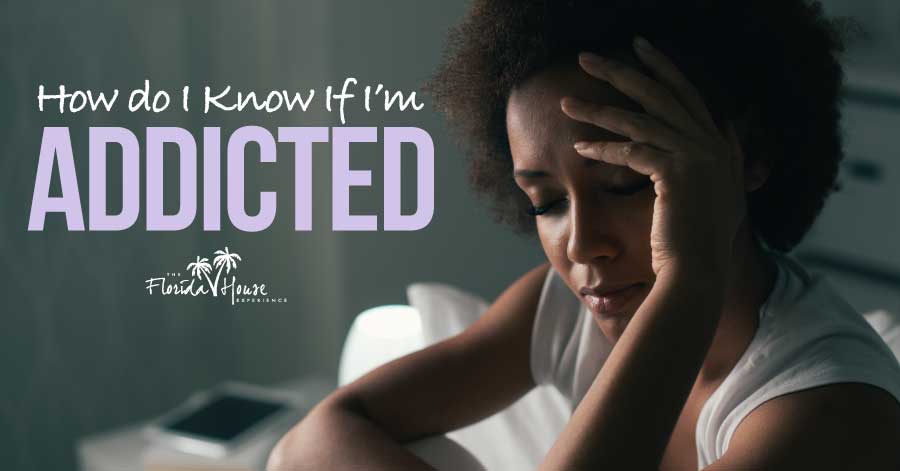
How do I know that I am addicted to something? Addiction is a terrifying disease, and often times it hits us before we even know it is there. But, the question remains, how do I know that I am addicted? Anyone who is addicted to a substance, whether alcohol or drugs, should seek addiction treatment. We at FHE Health have some of the best rehab facilities available, with some of the most professional treatment you can get! That being said, when is the right time to be seeking treatment? Here are a few tell-tale signs that you may be addicted.
Development of Cravings
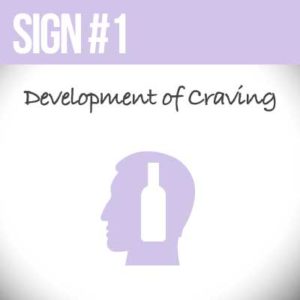 Are you experiencing cravings? This is essentially how our bodies become addicted. You are thirsty, so you drink a glass of water. You are hungry so you eat a burger. The feeling of pleasure associated with satisfying those cravings is similar to the feeling associated with drug addiction. If you are feeling as if you need drugs or alcohol, craving them, and thinking about them constantly, it may be time to seek addiction treatment. Unhealthy cravings can be recognized in the morning. If you spend a night drinking and when you wake up the first thing you want is another drink, then you have a drinking problem. If you find yourself craving drugs or alcohol early in the day or multiple times a day, this can be a sign of an unhealthy use of drugs or alcohol. Another tell-tale sign of unhealthy cravings is craving them at unusual times. Are you craving alcohol or drugs when at work, important events, or quality family times? This is a sign that you may have a problem.
Are you experiencing cravings? This is essentially how our bodies become addicted. You are thirsty, so you drink a glass of water. You are hungry so you eat a burger. The feeling of pleasure associated with satisfying those cravings is similar to the feeling associated with drug addiction. If you are feeling as if you need drugs or alcohol, craving them, and thinking about them constantly, it may be time to seek addiction treatment. Unhealthy cravings can be recognized in the morning. If you spend a night drinking and when you wake up the first thing you want is another drink, then you have a drinking problem. If you find yourself craving drugs or alcohol early in the day or multiple times a day, this can be a sign of an unhealthy use of drugs or alcohol. Another tell-tale sign of unhealthy cravings is craving them at unusual times. Are you craving alcohol or drugs when at work, important events, or quality family times? This is a sign that you may have a problem.
Mental and/or Physical Dependence
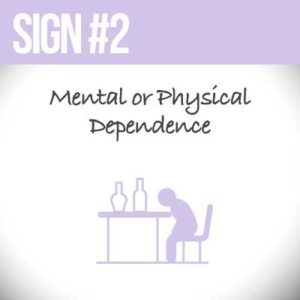 Over time, people become dependent on the substance. What does this mean? The answer is simple. When you satisfy those cravings we talked about before, your body recognizes that it feels good. Thus, natural selection causes our bodies to crave things that keep us alive, that is the “feel good” feeling we get when we eat salads or drink water. The same happens when we take drugs or consume alcohol. Naturally, our bodies produce chemicals that tell us that things feel good, then, we crave the good feeling. However, after a bit, we no longer are able to feel normal without the substance. At this point, you are dependent and need to seek addiction treatment. If you feel the need to use drugs or alcohol in order to function at work, in order to have fun with friends, or in order to keep off a sick feeling, you have a dependency problem. At this stage, it can be very difficult to stay off drugs and alcohol without help.
Over time, people become dependent on the substance. What does this mean? The answer is simple. When you satisfy those cravings we talked about before, your body recognizes that it feels good. Thus, natural selection causes our bodies to crave things that keep us alive, that is the “feel good” feeling we get when we eat salads or drink water. The same happens when we take drugs or consume alcohol. Naturally, our bodies produce chemicals that tell us that things feel good, then, we crave the good feeling. However, after a bit, we no longer are able to feel normal without the substance. At this point, you are dependent and need to seek addiction treatment. If you feel the need to use drugs or alcohol in order to function at work, in order to have fun with friends, or in order to keep off a sick feeling, you have a dependency problem. At this stage, it can be very difficult to stay off drugs and alcohol without help.
At first, you may just see your dependence as a temporary solution to a current situation or life event. Yo may justify that you can do this for a period of time because of other issues in your life. However, just using negative life events to justify using drugs or alcohol is just another sign that serious dependence is setting in.
Increase in Alcohol or Drug Tolerance
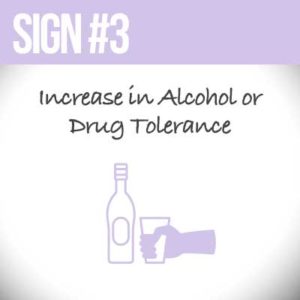 A high-schooler named Matt breaks his leg playing sports. Then, he is prescribed painkillers for the difficult injury. No one would say Matt is a bad person for taking his prescribed painkillers. After a while, however, Matt notices that the painkillers do not have the same effect on his body. The pills that would once soothe him, no longer ease his pain, in fact, he finds he needs to take more than what was prescribed to him, in order for the drugs to work. This is what is called being tolerant. Your body builds up a tolerance to the effect of a drug or alcohol, then you need more of said substance in order for it to have the same lasting effects.
A high-schooler named Matt breaks his leg playing sports. Then, he is prescribed painkillers for the difficult injury. No one would say Matt is a bad person for taking his prescribed painkillers. After a while, however, Matt notices that the painkillers do not have the same effect on his body. The pills that would once soothe him, no longer ease his pain, in fact, he finds he needs to take more than what was prescribed to him, in order for the drugs to work. This is what is called being tolerant. Your body builds up a tolerance to the effect of a drug or alcohol, then you need more of said substance in order for it to have the same lasting effects.
If you are feeling as though the substance you used no longer has the effects it once had, then you are on track to developing an addiction. Tolerance can be noticed even in alcohol which is socially acceptable. If at one point it only took a couple beers or a glass of wine to get a buzz, but now you need 4-6 drinks in order to get the same “buzzed” feeling, you are developing a tolerance. If you find yourself having a few drinks before going out for a night of drinking so that you get a buzz faster, you have developed a tolerance. With hard drugs like cocaine or heroin, a tolerance can be developed very quickly. As you use every day, you will need more and more in order to get the same high feeling you are craving. While this gets progressively more expensive, it also gets more dangerous. You may get a stronger batch of heroin than you typically get, but still, use a large amount to satisfy your tolerance. Unknowingly, you use far too much and end up overdosing. Other people may be heavy users, then take some time off. When they return to the drugs, their tolerance has gone down, but they still use the same amount they needed in the past. This creates a dangerous situation and often leads to an overdose.
Experiencing Withdrawal Symptoms
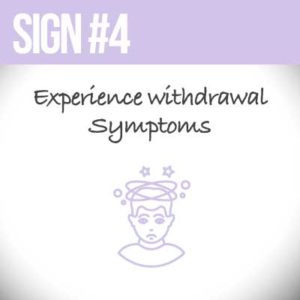 Matt does not know what to do anymore. He decided he needs the painkillers and does not want to tell his parents or friends about him, after all, addiction is taboo and cannot be talked about (obviously this is harmful and we must do away with the stigma about addiction, but it is a reality). Thus, he gets more prescriptions from multiple doctors. After a bit, however, he is caught. Disciplined by his parents, cut off by doctors, Matt has no idea what to do. Shortly, he begins to experience hallucinations, shaking, nausea, and other horrible bodily feelings. This is what is called withdrawal effects. It occurs when you build up a dependency to a certain substance, then the body cannot feel normal without the substance. Lashing out, the body goes into withdrawal.
Matt does not know what to do anymore. He decided he needs the painkillers and does not want to tell his parents or friends about him, after all, addiction is taboo and cannot be talked about (obviously this is harmful and we must do away with the stigma about addiction, but it is a reality). Thus, he gets more prescriptions from multiple doctors. After a bit, however, he is caught. Disciplined by his parents, cut off by doctors, Matt has no idea what to do. Shortly, he begins to experience hallucinations, shaking, nausea, and other horrible bodily feelings. This is what is called withdrawal effects. It occurs when you build up a dependency to a certain substance, then the body cannot feel normal without the substance. Lashing out, the body goes into withdrawal.
Withdrawal symptoms come in many different forms and are different for everyone based on gender, age, a drug of choice, length of dependence, and stage of withdrawal. Regardless of what drug you are withdrawing from, it will feel as though you are very sick. You won’t be able to stop these horrible feelings until you are able to get that drug in your system. Some withdrawal symptoms can last weeks at a time before the body can adjust and function normally. Withdrawal symptoms are much easier to deal with when you are at a licensed detox facility surrounded by doctors who can help you stay comfortable. Additionally, these doctors can administer medication to help ease the negative withdrawal symptoms and help you get through the detoxification process.
Poor Judgment or Decision Making
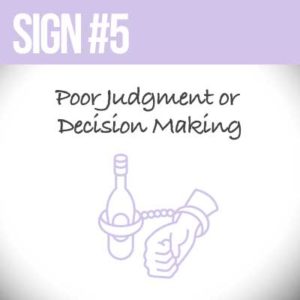 Matt does not know what to do. He cannot tell his parents what he is experiencing, he cannot get his prescription painkillers anymore, but he cannot handle the horrible withdrawal effects. Although he knows it is wrong, and that using heroin will make him go down a much worse path in life, he decides it’s the only way to escape the dangerous withdrawal effects. This is a harsh reality of how many addictions are formed. Since addiction is a disease that changes your brain’s reward, motivation, and memory, it is difficult for the person to be able to properly judge their actions.
Matt does not know what to do. He cannot tell his parents what he is experiencing, he cannot get his prescription painkillers anymore, but he cannot handle the horrible withdrawal effects. Although he knows it is wrong, and that using heroin will make him go down a much worse path in life, he decides it’s the only way to escape the dangerous withdrawal effects. This is a harsh reality of how many addictions are formed. Since addiction is a disease that changes your brain’s reward, motivation, and memory, it is difficult for the person to be able to properly judge their actions.
If you find yourself constantly making poor judgment calls, it could be because addiction has taken control of your brain, and you need addiction recovery. This does not mean you are less intelligent, it means the wires in your brain have been rewired with one goal; “get more of the substance.” While you may have had sound judgment in the past when in active addiction your judgment will change completely and any control you had before will be gone. When your body is in that much pain it is not a matter of judgment or willpower to stay sober, it simply feels like a life or death situation.
Isolation
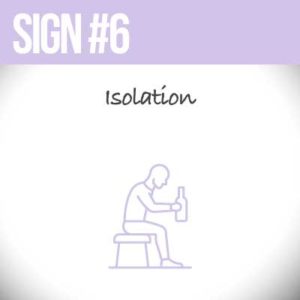 The correlation between addiction and isolation is staggering. If you are feeling like you can only be yourself when you’re alone with the substance, or feel like nobody cares about you, then you may be suffering from feelings of isolation. Isolation is a telltale sign of addiction, and can sometimes even cause it. The correlation between mental health, mental illness, and addiction are interconnected and go hand in hand most of the time. Nearly 70% of people who have a substance abuse problem also have a co-occurring mental health disorder. We at The Florida Health Experience care about your mental health and want to make it better, we believe both need to be treated together. That being said, isolation, mental illness, and addiction are all parts of the whole problem. Addiction treatment is needed if you are feeling both isolated and experiencing a substance use disorder. The road is long, but the good news is there is light at the end of the tunnel. We at FHE Health truly care for you and want you to get help. We have the experience and medical experts to evaluate and treat any mental or behavioral health problems you may be dealing with.
The correlation between addiction and isolation is staggering. If you are feeling like you can only be yourself when you’re alone with the substance, or feel like nobody cares about you, then you may be suffering from feelings of isolation. Isolation is a telltale sign of addiction, and can sometimes even cause it. The correlation between mental health, mental illness, and addiction are interconnected and go hand in hand most of the time. Nearly 70% of people who have a substance abuse problem also have a co-occurring mental health disorder. We at The Florida Health Experience care about your mental health and want to make it better, we believe both need to be treated together. That being said, isolation, mental illness, and addiction are all parts of the whole problem. Addiction treatment is needed if you are feeling both isolated and experiencing a substance use disorder. The road is long, but the good news is there is light at the end of the tunnel. We at FHE Health truly care for you and want you to get help. We have the experience and medical experts to evaluate and treat any mental or behavioral health problems you may be dealing with.
Get Help for Addiction
If you or a loved one are experiencing any of the above symptoms, it may be time to seek professional treatment. We at FHE Health want to help you with anything you need. Speak to one of our experienced staff now at (833) 596-3502 . Help is right around the corner, odds are, if you are asking if you are addicted, there may be a problem. Take your life back today.






